Case Study: Improving LaTeX Accessibility and Ease-of-Use for the Research Community with The University of Manchester
Jamie · June 17, 2022On June 26, 2020, The University of Manchester launched Overleaf Commons, an institution-wide Overleaf subscription that provides a range of services and solutions, including upgrades to Overleaf Professional for the university's postgraduate research students (PGRs), faculty and staff.
Prior to the University's adoption of the subscription, the majority of PGRs and researchers writing in LaTeX used Overleaf's free version, with another minority using a number of other LaTeX authoring tools.
The University's Research Lifecycle Programme was involved in a long-term project that involved finding multiple ways of enhancing researchers' ways of working. With the aim of enhancing the tools that were available for the research community and better facilitating external collaborations (a substantial amount of collaborations at The University of Manchester are with external universities), Overleaf became the clear solution of choice considering the number of PGRs already using the software and the University's long-term goals.
This case study details The University of Manchester's adoption of Overleaf Commons and the results that can be seen in the 17 months after the subscription package went into effect.
Key Statistics
Here are some key statistics arising from an analysis of the first 17 months of The University of Manchester's Overleaf Commons subscription:
- 420% increase in the number of institutions with members working with Overleaf users at The University of Manchester, increasing from 143 institutions to 743.
- 194% increase in registration: rising from 1538 to 4537.
- 310% increase in new projects, jumping from 633 to 2597.
- 467% increase in the monthly number of new Overleaf registrations compared to pre-subscription period, from an average of 31 registrations per month to 176.
- 404% increase in the number of new projects per month compared to pre-subscription period, from 23 projects per month to 116.
Challenges
Prior to the adoption of an Overleaf Commons institution-wide subscription, most PGRs and faculty involved in writing and collaborating on scientific documents, particularly PhD students and researchers, were familiar with and using LaTeX. Some of them were already using Overleaf, but most of these individual accounts were running on the free version with limited functionality. The others were using various setups of LaTeX software that involved individual installation and version control systems.
With PGRs and faculty using different LaTeX setups, a number of challenges were apparent
Collaboration
Challenges: When working on projects with multiple authors using different LaTeX setups across different computers, collaboration becomes tedious and often susceptible to error. The most common way collaborators shared their documents was via email, leading to endless amounts of email threads and confusion around the renaming of documents in their various versions. Collaborators would also run into LaTeX compilation issues due to the various types of LaTeX installations in use by the collaborators. Different 'flavors' of LaTeX don’t always work well together, which caused difficulties in collaboration. This way of working was time-consuming, error-prone and inefficient overall.
How Overleaf helped: Overleaf acts as an entry point to file editing and works in the browser, being system-agnostic. There's no immediate risk with file encoding issues and users don’t need to worry about their local setup. With Overleaf's collaborative interface users can invite named collaborators to their project via the 'share' menu (with read-only or edit access). Users simply add their email address and an email invitation will be sent to them. These named collaborators can be removed at any time via the same ‘share’ menu.
Templates
Challenges: A lack of easily accessible templates for researchers to work from made the task of authoring an onerous one. While the types of documentation have guidelines themselves, writing in LaTeX using varying setups posed several complications, especially for those new to LaTeX itself. Writing a LaTeX document from scratch might be challenging when certain layout and formatting requirements have to be addressed.
How Overleaf helped: Overleaf has a gallery in which users can preview and select a template matching their requirements. The template search feature is intuitive and users can easily start a document by simply clicking on a template. Overleaf automatically creates a project and deploys the template. It's worth mentioning that templates sent by verified groups also get an "official" badge, so there's a visual hint at the quality of these templates.
A template can be seen as a "fill in the blanks" type of document, so users can focus on the actual content instead of spending time and effort to adjust layout and formatting. Overleaf can create a project based on a template, so the deployment procedure is pretty much transparent, which means users can start working as soon as they choose the template to their liking.
Maintenance
Challenges: Prior to The University of Manchester's Overleaf Commons subscription, LaTeX users worked from varying LaTeX installations and versions, which involved different maintenance systems and requirements. Installing and maintaining a local TeX distribution might be challenging for a significant portion of users. Certain installs require privileged access (in which certain cases are bound by the IT department) or do not cover all packages needed to compile specific documents.
How Overleaf helped: Overleaf provides a zero-install approach where the user gets a working LaTeX environment + editor in the browser (no privileged access is required), with a range of full TeX distributions (featuring all packages) available.
Onboarding
Challenges: Collaborating with those new to LaTeX was no easy task, starting from the install procedure itself and the need to choose a TeX editor. Error messages might also be difficult to understand. These things often involve a steep, technically-daunting learning curve. With authors at the University each using their own setups and varying flavors of LaTeX, onboarding new users and facilitating collaboration proved difficult and sometimes overwhelming for LaTeX novices.
How Overleaf helped: Overleaf provides a complete LaTeX environment in the browser with a clean and task-oriented interface. When a blank project is created, the basic document structure is already provided, so the user already gets a working code. The interface provides a rich text mode in which some commands are presented in a visual manner, so users can pick up the workflow that's more comfortable for them (and even alternate them). Overleaf makes it easy to upload files, as well as organizing them into folders.
What Is Overleaf Commons?
Overleaf Commons is a comprehensive subscription package for institutions, providing:
- Overleaf Premium subscriptions for students, faculty, researchers and staff;
- a branded institutional web portal providing individuals with simple sign-up to the Overleaf institutional subscription - no institutional administration required;
- administrative data hub containing analytics/metrics on institutional Overleaf use and growth;
- dedicated Overleaf Client Services Manager;
- user training and support for students, faculty and staff;
- marketing and promotional support to help spread the word about Overleaf to the institutional community
The University of Manchester Portal
As part of the Overleaf Commons package, institutions are provided with a branded point-of-presence web portal, which acts as an access point for university members to sign-in to, or sign-up for, an Overleaf premium subscription or to find further information. It also provides easy access to the university’s LaTeX templates hosted on Overleaf.
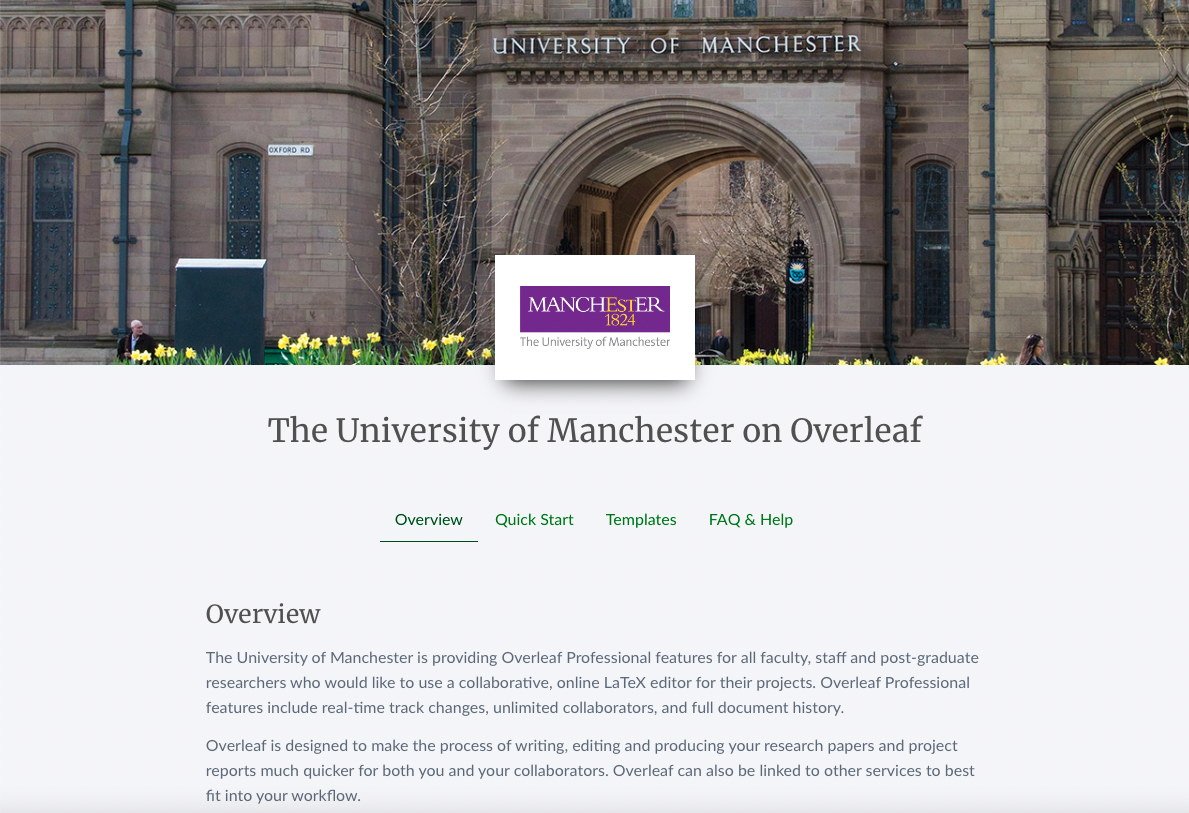
Figure 1: The University of Manchester Portal, providing a fully branded point-of-presence for distribution of information and LaTeX templates plus a convenient way to sign-in to, or sign-up for, Overleaf.
Through the dedicated Overleaf portal, members of The University of Manchester can quickly register to access an Overleaf premium subscription, which provides a range of services not available through free accounts, including:
- Unlimited collaboration: Authors can invite an unlimited number of collaborators into their projects (free users can invite 1).
- Increased compile timeout: Authors are given more time for compilation before receiving a timeout error message.
- Real-time track changes: With real-time track changes, commenting and integrated chat, users can keep track of changes made to their project and discuss their work without having to switch to email, printed versions or any other tool.
- Reference tool linking: Multiple reference tool linking options — the user can link popular reference management systems directly to their Overleaf account — allowing fast, simple and correct in-document referencing.
- Advanced reference search: Users can search by citation key, and our premium feature allows the added ability to search by author, title, year, or journal.
- Dropbox and GitHub integration: Two way syncing to a user's Dropbox and GitHub accounts.
- Full document history and versioning: The full history service automatically tracks all changes made to an Overleaf project — authors can compare changes between versions, and restore previous versions of their work for the life of the project.
- Priority support: Overleaf supports all its users, even those with free accounts, but premium subscribers are prioritized to ensure they receive the quickest possible response — from initial contact through to resolution of the issue. Our support team can help with questions on the platform, templates or LaTeX itself!
The University of Manchester Admin Hub
Also part of The University of Manchester's Overleaf Commons subscription, and separate to the public-facing portal, is a dedicated Administrator Hub, which provides administrative staff with statistics, exportable data, and graphics on the use of Overleaf at their institution. It provides analytics on platform use, users, projects, internal and external collaborations and submissions.
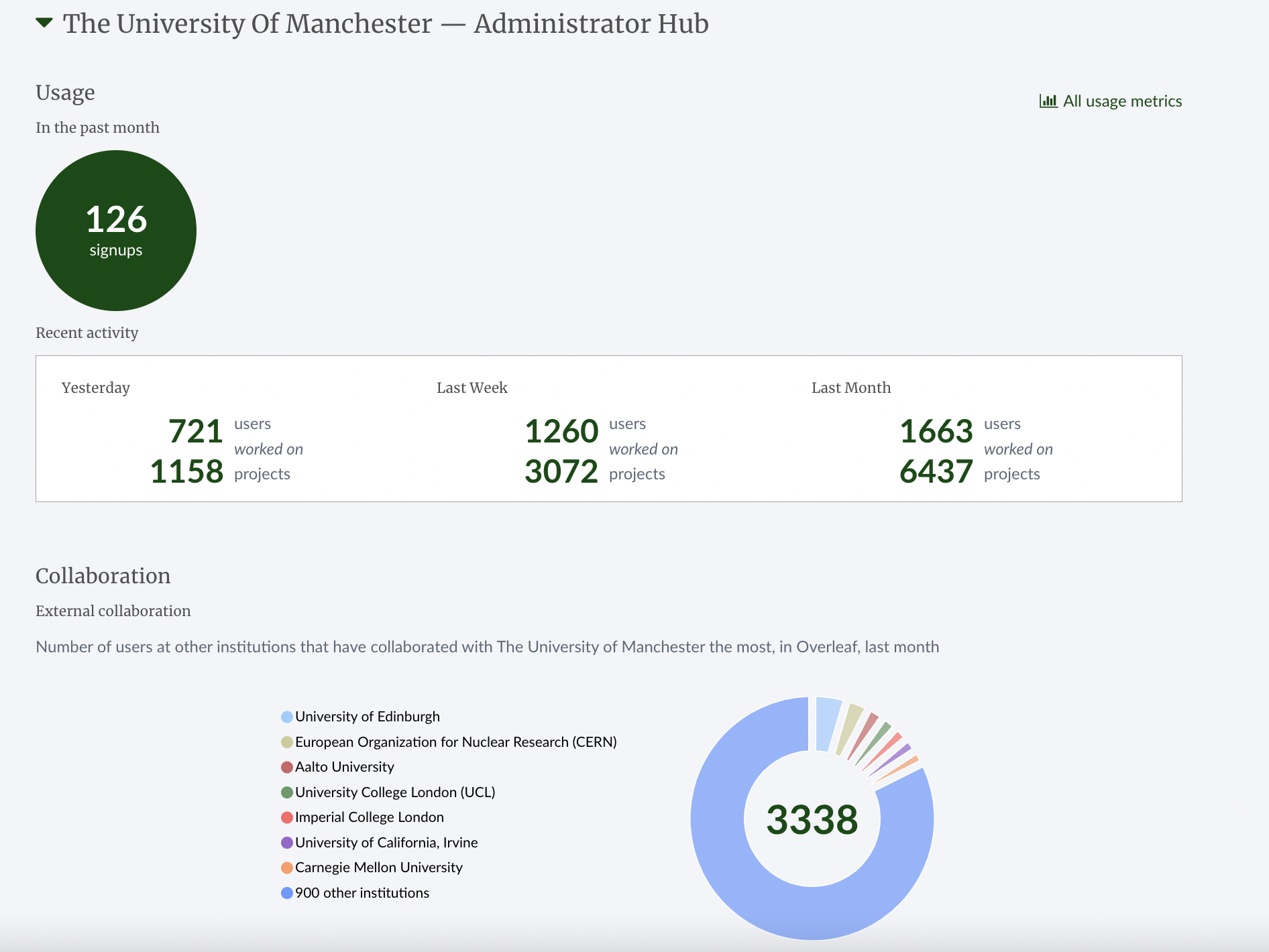
Figure 2: The University of Manchester’s Administrator Hub: Providing university administrators with Overleaf usage statistics and metrics.
Use of Overleaf at The University of Manchester
When users register for their Overleaf account they are asked if they would like to provide the department in which they are based. As of December 1, 2021, and based on users who chose to provide their department or school during sign-up, here is a graphic from The University of Manchester's Administrator Hub that provides a breakdown of registered users by department.
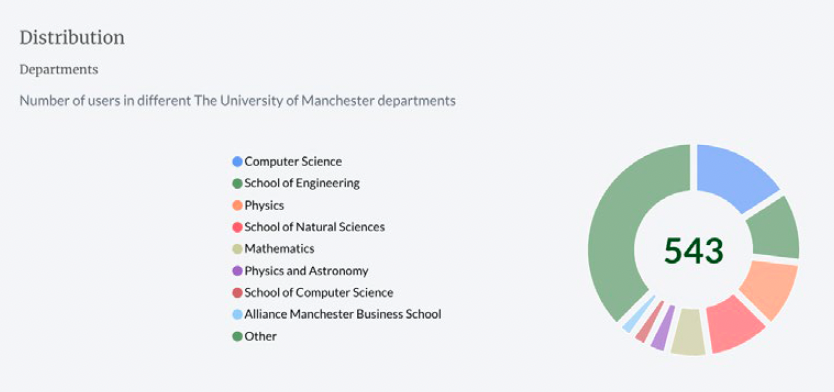
Figure 3: Breakdown, by department, of registered Overleaf users at The University of Manchester (as of 1 December 2021).
Departments Using Overleaf at The University of Manchester
In terms of most registered users, the top 8 departments using Overleaf are:
School/Department/Number of Overleaf Users
- Computer Science: 88
- Physics: 60
- School of Engineering: 57
- School of Natural Sciences: 55
- Mathematics: 33
- Physics and Astronomy: 14
- School of Computer Science: 11
- Alliance Manchester Business School: 10
Supporting Collaborations & Fostering Partnerships at The University of Manchester
Overleaf provides PGRs, faculty and staff at The University of Manchester a platform through which multiple authors can work together to produce sophisticated publications — by leveraging the power of LaTeX and taking advantage of powerful features provided by Overleaf's partnerships with leading vendors of researcher workflow tools and services.
Results from The University of Manchester's trial clearly demonstrate that users across a wide range of departments and schools have registered to use Overleaf — building a communal workspace that provides an infrastructure capable of supporting teams engaged in multidisciplinary research projects. Those teams can work together seamlessly and collaborate on the preparation and publication of research, reports, journal papers, conference proceedings and books.
The University of Manchester: Collaborations with external institutions via Overleaf
A vital part of research collaborations is the preparation and publication of scholarly articles, so we analyzed Overleaf's data for The University of Manchester. We are delighted to share those results that show strong growth in the number of external institutions whose members are collaborating with The University of Manchester users via Overleaf. Since the introduction of Overleaf Commons in June 2020, the number of external institutions with members working with Overleaf users at The University of Manchester has increased from 221 institutions to over 837, or a 278% increase.
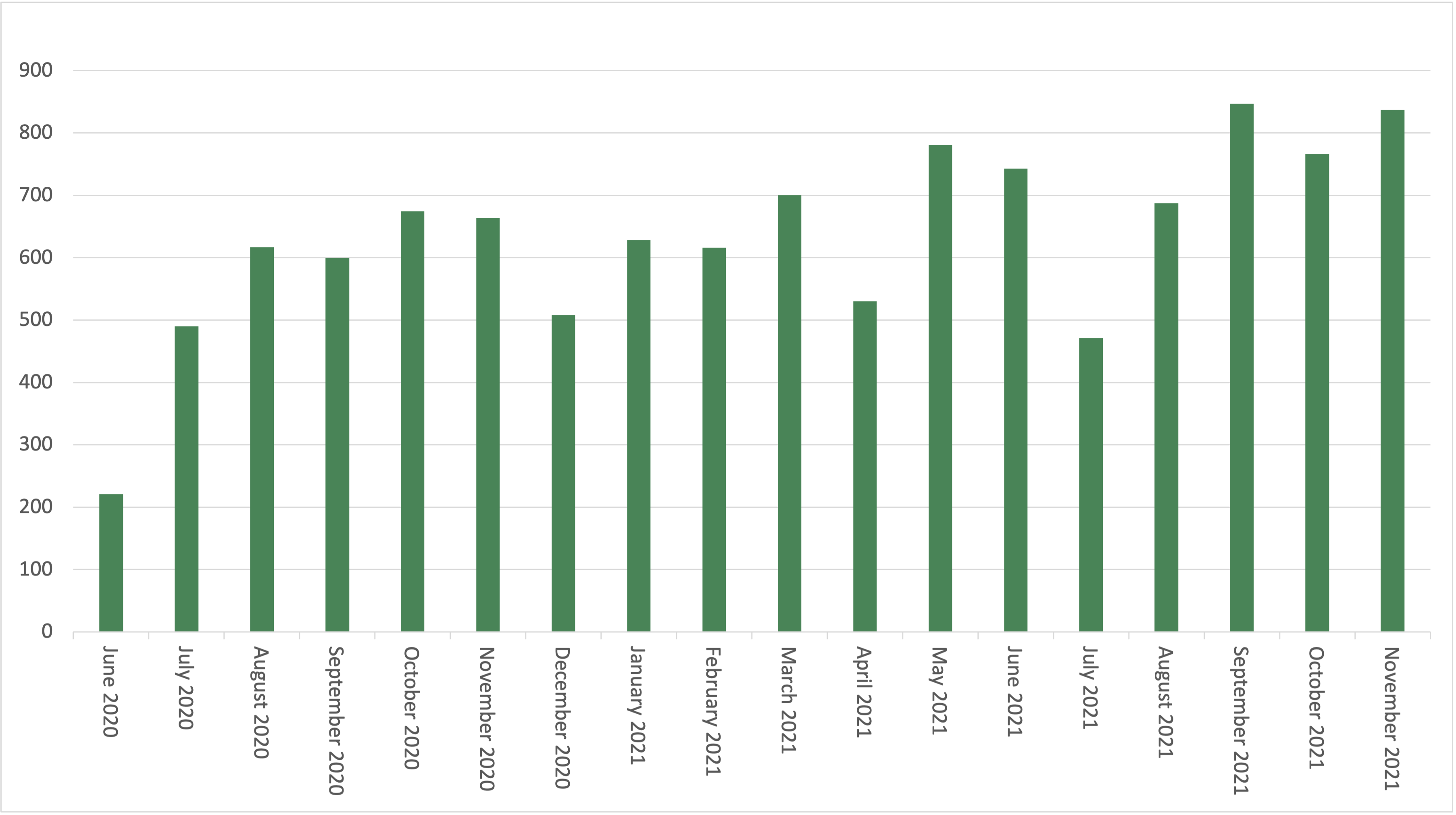
Figure 4: Significant growth in the number of external institutions whose members are collaborating with The University of Manchester users via Overleaf.
Overleaf Integrations
Any new service whose aim is to assist researchers needs to be highly connected in the digital ecosystem in which they work — isolated islands of functionality are no longer sufficient. Overleaf has integrations with a range of tools and services that form part of many researchers' everyday workflow — including simplified submission into repository services such as figshare and arXiv, integrations with version control systems such as Git, through to direct submission into many scholarly publishers such as IEEE and PNAS. Overleaf also integrates with bibliography management services including Mendeley and Zotero.
Growth in Overleaf registrations at The University of Manchester
The following graphic, taken from The University of Manchester's Administrator Hub, shows a quite spectacular growth in the number of registered users (titled "Affiliations" in this graph).
Before acquiring an Overleaf Commons subscription, from January 1, 2020 to June 1, 2020, the number of registered users increased from 1146 to 1302, an increase of 156 (13.6%), giving a monthly average increase in registrations of 31 during that 5-month period.
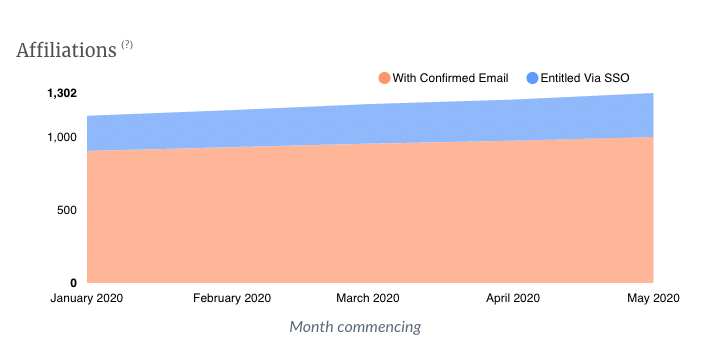 Figure 5: Growth in the number of new Overleaf registrations prior to the launch of Overleaf Commons at The University of Manchester.
Figure 5: Growth in the number of new Overleaf registrations prior to the launch of Overleaf Commons at The University of Manchester.
After acquiring an Overleaf Commons subscription, from June 26, 2020 to December 1, 2021, the number of registered users grew from 1538 to 4537, an increase of 2999 (194%), giving a monthly average increase of 176 registrations per month in that 17 month period.
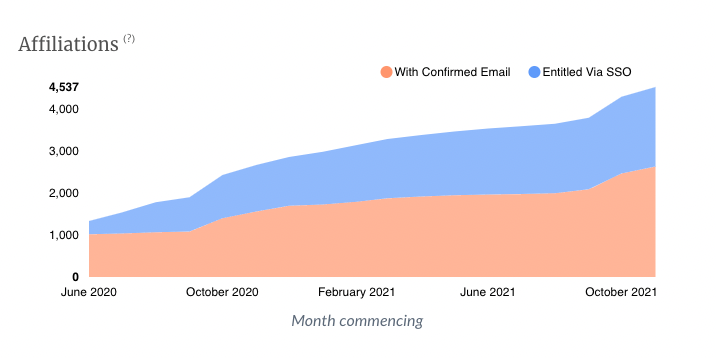 Figure 6: Significant growth in the number of new Overleaf registrations
following the launch of Overleaf Commons at The University of Manchester.
Figure 6: Significant growth in the number of new Overleaf registrations
following the launch of Overleaf Commons at The University of Manchester.
During the first 17 months of the University’s subscription period there has been:
- 194% increase in affiliations, jumping from 1538 to 4537;
- 467% increase in the monthly number of new affiliations per month compared to pre-subscription period, from an average of 31 registrations per month to 176.
Growth in new Overleaf projects at The University of Manchester
From January 1, 2020 to June 1, 2020 the number of projects grew from 523 to 636: an increase of 113 projects (21.6%) in 5 months, or approximately 23 projects per month.
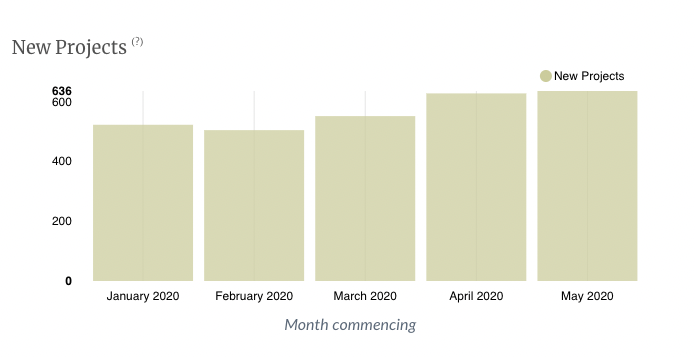
Figure 7: Growth in the number of new Overleaf projects prior to the launch of Overleaf Commons at The University of Manchester.
From the launch of Overleaf Commons subscription on June 26, 2020 to December 1, 2021 the number of projects grew from 633 to 2597: an increase of 1964 projects (310%) in 17 months, or approximately 116 projects per month.
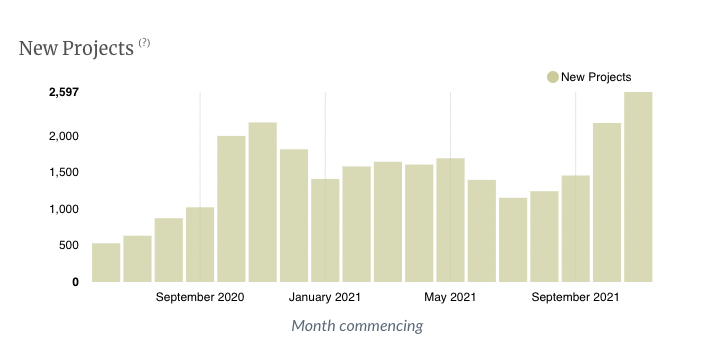
Figure 8: Significant growth in the number of new Overleaf projects following the launch of Overleaf Commons at The University of Manchester.
During the first 17 months of the University's subscription period there has been:
- 310% increase in new projects, jumping from 633 to 2597;
- 404% increase in the number of new projects per month compared to pre-subscription period, from 23 projects per month to 116.
Priority Support to Encourage Growth & LaTeX Adoption at The University of Manchester
As an Overleaf Commons subscriber, The University of Manchester receives priority support from the Overleaf Account Management, Onboarding and Customer Service teams.
During the Overleaf Commons onboarding process, University administrators received full support for setup, including Single Sign-On (SSO) configuration, developing the University's custom online portal - including setting up the streamlined enrollment process for new users, the upgrading of existing Overleaf users to a premium Overleaf subscription, and training on The University of Manchester's Admin and Metrics Hub.
Overleaf has also prepared a number of useful video tutorials and online guides meant for all user levels to promote quicker adoption and ease-of-use. The University of Manchester and Overleaf webinars were also scheduled to train University of Manchester PGRs, faculty and staff on how to use Overleaf — these webinars were coordinated and presented by Overleaf.
Fiona Treacy, Research Community Engagement Officer at The University of Manchester, recounts working with the Overleaf team to launch the webinar:
"Ryan [Overleaf Customer Services Director] has been fantastic in hosting UoM specific webinars. We designed one called "Using Overleaf for Literature Reviews" because that's what incoming PGRs (postgraduate researchers) would be focusing on straight away so it has made it more accessible in a way that they can actually see how they can use Overleaf not just for their lit review but going forward and using it as a tool to collaborate on their thesis or research papers as well."
Overleaf's helpful articles and tutorials are also highly visited in The University of Manchester’s Research Lifecycle Programme website. ¨We have a lot of different projects that deliver different services and items, but when I look at our Research Lifecycle Programme website… people seem to engage most with the articles that come out about Overleaf. With webinars we definitely have the highest uptake. That tells me people like it."
What The University of Manchester Users Say
In a survey conducted in May 2021, the Research Lifecycle Programme administrators at The University of Manchester conducted a survey to ask users who were actively using Overleaf Premium subscriptions what they thought worked exceptionally well. Below are just a few of the responses:
"Collaboration – simultaneous editing of multiple authors. Good and simple repository for collaborative work."
"Fast compilation times and good with very large documents. Web interface means [you] can use it anywhere without any compromise in performance. Plus it is as good as any standalone LaTeX system."
"I like to be able to easily share papers with my co-authors, edit them and have the papers in a place that is easy to access by everybody. I also like the integration with Github."
"My favourite part of Overleaf is the LaTeX editor. The compiling errors are readable and actually useful."
"Everything – it's a very easy way to prepare manuscripts for publication. It is the gold standard in scientific publishing at the moment and essential for distributed collaborations in which there are many authors from many different countries/institutes."
"I have been using Overleaf Pro to write a grant application collaboratively with colleagues in Germany. The ability to work on one document and assure version control has been a real advantage, without mailing documents back and forth."
Overleaf: for LaTeX and non-LaTeX users
To use Overleaf you only need internet access and a device equipped with a modern browser, that's it — whether you use Windows, Linux or Mac OS. No longer do individuals or institutions need to install or manage complex LaTeX setups. In addition to an extremely convenient collaborative authoring and editing environment, researchers can take full advantage of the suite of services integrated into Overleaf. However, one question remains: to use LaTeX, or not?
But my colleagues won’t use LaTeX!
It’s true that LaTeX isn’t for everyone — most people prefer to use word processors and the choice of authorship/collaboration tools can be an important consideration for co-authors. To address that challenge, Overleaf’s text editor can be switched to Rich Text mode that provides a "word processor"-like editing environment, which can enable LaTeX and non-LaTeX users to easily collaborate on the same paper—facilitating cooperation between authors from very different backgrounds. Additionally, non-LaTeX authors can use Overleaf to upload text files (and graphics etc.), which can then be suitably marked-up into LaTeX by colleagues or co-authors who are comfortable with LaTeX.
Concluding remarks
Universities have a complex matrix of challenges, aims and objectives: the need to attract investment and funding; delivering an environment conducive to study, teaching and research excellence; building national and international collaborations and partnerships; participating in mandatory governmental reviews and assessments (such as the Research Excellence Framework in the UK) right through to making vital contributions for the benefit of society as a whole. Individual researchers need to achieve recognition of their scholarship, usually through some form of publication which, increasingly, has to include compliance with funder mandates on open access.
For any institution to invest in new services for its community there needs to be tangible, and often measurable, benefits: at the institutional and departmental level, and for individual students, staff and researchers. The rapid growth in Overleaf's adoption and use at The University of Manchester suggests that it can contribute to institutional objectives by supporting the needs of staff, PGRs and researchers.
About The University of Manchester
The University of Manchester is a place where research has a global impact, where students experience outstanding teaching and learning, helping them to develop into tomorrow's leaders, and where all activity is enriched by a commitment to social responsibility. Manchester was the first and most eminent of England's civic universities. Today, the University forms part of the prestigious Russell Group of UK universities, with an international reputation for the highest level of research and teaching. It is our vision to be one of the world's leading universities and to be recognised for our global impact, our revolutionary spirit and our role in one of the UK's most progressive cities.
Get in Touch
If you’re interested in how you can use Overleaf for collaborative projects you can sign-up for a free account today. Alternatively if you’re interested in learning about an Overleaf Commons account for your organization, please get in touch.